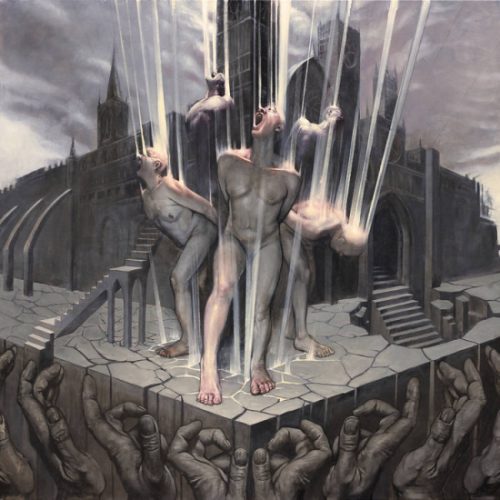
(Andy Synn continues his impromptu “Best of British” week with his thoughts on the upcoming new album from Rannoch)
The word “masterpiece” has been roundly, and soundly, (over) used and abused so much over the years that it’s almost lost all meaning.
But, originally, a “masterpiece” wasn’t just something of exceptional quality – it specifically referred to that piece of work which first demonstrated an artist’s mastery of their craft and, in doing so, signified their acceptance into (or, at least, their eligibility for) the highest echelons of the artistic community.
Strictly speaking, then, no band should ever have more than one “masterpiece” to their name.
So if Rannoch‘s previous album, the masterful Reflections Upon Darkness, represented the moment when they stepped into the big leagues – in terms of both talent and ambition, at least, if not fame – then what does this mean for Conflagrations?

Well, the good news is that there’s nothing written anywhere that says an artist’s “masterpiece” – by the traditional measure – also has to remain their best work forever.
As a matter of fact, if anything, I’d argue that once an artist has achieved such a feat and gained entry into the upper ranks then there’s an expectation that all their subsequent work should be as good as, if not superior to, their original “masterpiece” – the one which set the standard by which they must be judged from that point on.
So when I say that Conflagrations is at least equal to its seminal predecessor, both in terms of its scintillating progressive ambition and its stunningly powerful execution, you know that’s not a statement I make lightly.
That doesn’t mean, however, that Conflagrations is simply Reflections… Part 2.
Because although the first half of the album serves as a seamless transition between the two records – with tracks like “Prism Black” and the technically-twisted “Threads” demonstrating an even more refined and rarefied version of Rannoch‘s distinctive blend of dense, post-Meshuggah riffage, catchy, Ihsahn-esque songwriting, and gloomy, Opeth-ian glamour – it soon becomes apparent that the band have taken a conscious step towards an even proggier sound this time around.
One casualty of this, however – because, let’s face it, something had to give – is that the more eccentrically “blackened” elements and embellishments have been pared back even further. But, while some fans may find this a little disappointing, this was never a hugely defining aspect of the band’s identity (not to my ears, anyway) and the extra room this frees up for the trio to explore and expand on both their technical talents and melodic sensibilities (more on that shortly) more than makes up for it.
Take, for example, the scintillating title-track, whose brooding opening minutes interweave intricate layers of synthetic soundscapes and organic instrumentation in a manner reminiscent of French post-genre fusionists Hypno5e, all of which eventually builds to a cathartic crescendo of stunningly heavy guitars and equally heavy emotions which recalls – without simply replicating – the absolute best of Accelerated Evolution-era Devin Townsend (albeit with an altogether darker and more desolate edge).
And it’s this latter comparison which I predict more and more people will be reaching for as time goes on, as while there’s no questioning the band’s commitment to the “extreme” side of things (“Daguerrotype”, for example, features some of the heaviest riffs and flashiest fretwork on the entire album – as well as some eye-openingly intense drumming from session sticksman Dan Presland, sounding more engaged and creatively challenged here than he has in years) their increased focus on mood and atmosphere is equally undeniable.
It all comes to a head with the album’s stupendous seventeen-minute finale, “Threnody to a Dying Star”, which pushes the group’s sound to its most melodic and progressive extremes – placing even more focus than ever on Ian Gillings’ outstanding, and extremely underrated, singing abilities – without sacrificing an ounce or iota of bombastic, biomechanical heaviness in the process, before ultimately climaxing with the sort of gargantuanly groovy and symphonically grandiose finale that practically guarantees you’ll immediately want to listen to the whole thing all over again.
Make no mistake about it, despite their relatively low profile (though, hopefully, with this album’s release on Willowtip next week that will soon change) Rannoch have become absolute masters of their craft, and so deserve to be held to the highest of standards.
And it’s to their credit that, somehow, they still manage to find ways to keep raising the bar each and every time.
